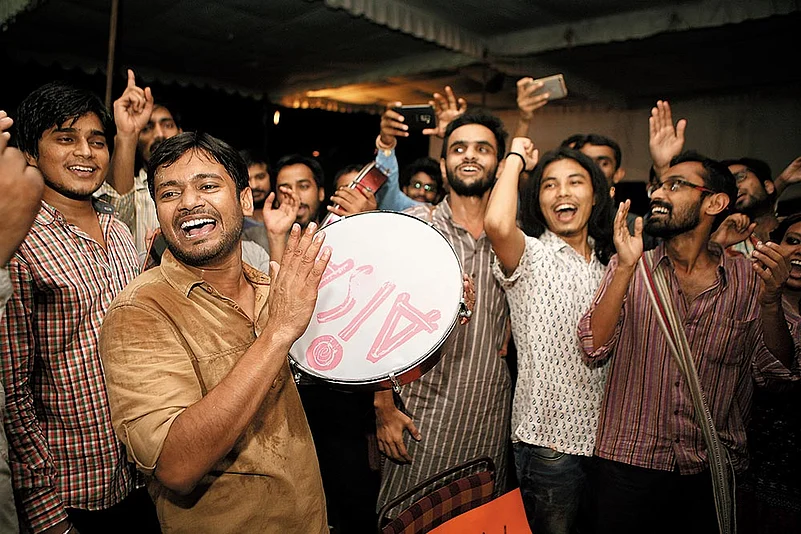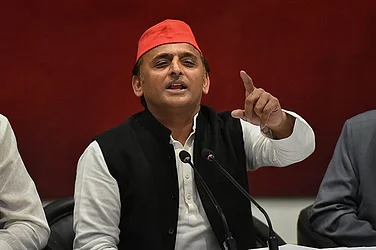- “The new student leaders have revived the culture of asking questions,” says Syed Naseer Hussain, MP.
- “Kanhaiya is proving that it’s wrong to say JNU politics can’t strike a chord outside,” says Albeena Shakil.
***
Kanhaiya Kumar, who was catapulted to fame with his widely televised February 2016 speech at Delhi’s JNU on returning from Tihar jail, where the then JNU students’ union president had been held under charges of sedition, has since emerged as one of the most heard voices against the ruling BJP and PM Narendra Modi. As the CPI candidate for Begusarai in Bihar, the 32-year-old native of the constituency has now drawn into his campaign other former JNUSU presidents, who have forsaken ideological nuances and rallied around him.
Syed Naseer Hussain, who led the JNUSU in 1999-2000 and is now a Rajya Sabha MP from the Congress, believes Kanhaiya has been largely successful in articulating the contemporary concerns of society within the CPI’s ideological framework. “The new student leaders have revived the culture of asking questions and the people will decide whether the questions are right or not. I want the candidate from our mahagathbandhan to win, but I must give Kanhaiya his due,” says Hussain, who completed his PhD from JNU in 2003, quit the CPI(M)-affiliated SFI to join the Congress youth wing and rose up its ranks to become the national secretary. “Even if you don’t get elected, if you raise people’s issues well, Parliament will be forced to take it up,” he adds.
According to V. Lenin Kumar, who helmed the union during 2012-13, one learns in JNU that contesting elections is not the only way of doing politics. “A social movement is also politics. I contribute to politics by teaching,” says Lenin, who teaches policy and government at MIT World Peace University in Pune. He was expelled from the SFI after he opposed the CPI(M)’s decision to support Pranab Mukherjee for the post of India’s President. He went on to float the Democratic Students Federation along with some other former SFI activists and was elected JNUSU president under the new banner. He says he would have loved to participate in Kanhaiya’s campaign, but could only contribute financially.
Among those who managed to make it to Begusarai is Albeena Shakil, who was JNUSU president in 2001-02. “Kanhaiya has emerged as an articulate and courageous voice of opposition that captures the people’s democratic aspirations. He speaks for the poor, the women and the youth. I am confident he’ll win,” says Albeena, who teaches English at Jindal Global Law School. Kanhaiya’s fight holds a special significance for her that goes well beyond the immediate context of Begusarai. “He is showing the world that JNU is not some kind of island. There has been an accusation against us for a long time that JNU politics can’t strike a chord with people outside, and that it’s not practical. It has been disproved time and again. It is being done once more in Begusarai even as we speak,” she says, adding that doing politics in JNU makes the student alive to a lot of issues from across the country, as the university has an incredibly diverse social composition with students from all parts of India coming to study there.
So what about the right-wing student leaders from JNU? What is their take on Kanhaiya’s latest fight? Sandeep Mahapatra, the only JNUSU president so far from the ABVP, the student wing of the RSS, says he would prefer a candidate with “nationalist credentials” over Kanhaiya. “JNU brotherhood is not above the country’s interests. If there are former JNU students who share the ideology I believe in and run for Parliament, I would certainly support them,” says Mahapatra, who headed the union in 2000-01.
A native of Kalahandi in Odisha, he now runs his own law firm and is also the RSS media in-charge for Delhi. Pointing out that not everybody can join full-time politics because of reasons ranging from personal to circumstantial, Mahapatra says, “Most JNU students come from various parts of the country. It is not easy to go back to where you came from and establish yourself politically there in this age of competitive politics. Yet, we all contribute in our own ways. I was general secretary of the Akhil Bharatiya Adhivakta Parishad (RSS-affiliated lawyers organisation) for three years.”


























